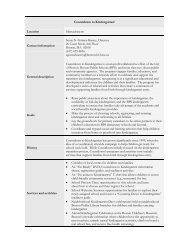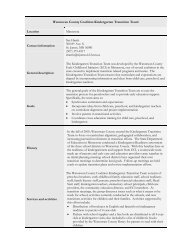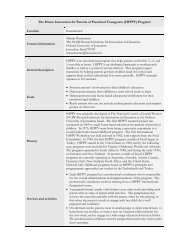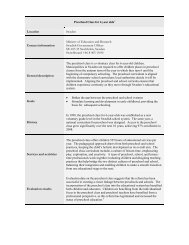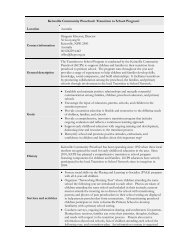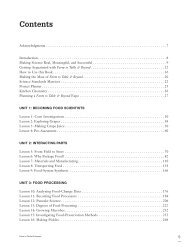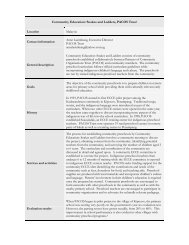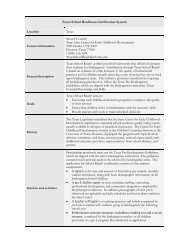Proceedings of the Fourth Annual Teachers College Educational ...
Proceedings of the Fourth Annual Teachers College Educational ...
Proceedings of the Fourth Annual Teachers College Educational ...
Create successful ePaper yourself
Turn your PDF publications into a flip-book with our unique Google optimized e-Paper software.
Investigating Potential Factors to Increase Levels <strong>of</strong> Participation in<br />
Class Discussion<br />
Apichai Chaiwinij,<br />
<strong>Teachers</strong> <strong>College</strong>, Columbia University, 549 W 123 Street, APT 12E, New York, NY 10027,<br />
Email: ac3344@tc.columbia.edu<br />
Abstract: While collaborative learning is globally employed, many studies point out that a<br />
majority <strong>of</strong> Asian students cannot adapt <strong>the</strong>mselves to collaborative learning<br />
environments and tend to be quiet in class discussion. This study aims to investigate<br />
three potential factors (online discussion, anonymity, and online role-play) that may<br />
contribute to a discussion environment and <strong>the</strong> level <strong>of</strong> students’ participation. In this<br />
study, <strong>the</strong>re were 32 subjects in total, consisting <strong>of</strong> four groups <strong>of</strong> eight subjects. They<br />
discussed six topics under six different discussion conditions, which were <strong>the</strong><br />
combination <strong>of</strong> three factors. The result confirmed that three factors can be employed to<br />
provide a discussion environment that promotes an increased level <strong>of</strong> participation<br />
among Asian students. In addition, type <strong>of</strong> roles like school leaders and country<br />
administrators did motivate <strong>the</strong> participants to seriously engage in role-playing and<br />
generate more critical and problem solving ideas.<br />
Teamwork and collaboration are among <strong>of</strong> <strong>the</strong> most important 21 st century learning skills (Schrier, 2006).<br />
Many educators have searched for ways to creatively integrate <strong>the</strong>se 21 st century skills into K-12<br />
pedagogy with innovative, effective, and appropriate activities (Schrier, 2006). One <strong>of</strong> <strong>the</strong> popular<br />
methods is to provide a collaborative learning environment in <strong>the</strong> school setting to instruct modern<br />
students. However, previous research states that a majority <strong>of</strong> Asian students cannot adapt quickly to<br />
collaborative learning environments (Wong, 2004). In order to assist Asian students, educators need to<br />
provide a suitable discussion environment to encourage <strong>the</strong>m to freely share <strong>the</strong>ir ideas with <strong>the</strong> group.<br />
Thus, <strong>the</strong> research attempted to investigate <strong>the</strong> potential factors that should be employed to develop a<br />
suitable discussion environment. Based on previous research, three potential factors are successfully<br />
used to increase levels <strong>of</strong> participation: (1) online discussion, (2) anonymity, and (3) online role-play.<br />
Online discussion and anonymity enables better performance in terms <strong>of</strong> quantity <strong>of</strong> work, generated<br />
(Chester, & Gwynne, 1998; Collins, & Berge, 1995; Hartman, Neuwirth, Kiesler, Cochran, Palmquist, &<br />
Zubrow, 1995; McComb, 1994; Rheingold, 1994; Ruberg, Moore, & Taylor, 1995). Fur<strong>the</strong>r, online roleplay<br />
improves students’ interpersonal and communication skills (Lloyd, 1998). Although past research has<br />
studied <strong>the</strong> effects <strong>of</strong> online discussion, anonymity, and online role-play on level <strong>of</strong> participation in group<br />
discussion, not many studies have looked at different factors along a continuum with Asian students.<br />
In this study, <strong>the</strong>re were 32 subjects in total, consisting <strong>of</strong> four groups <strong>of</strong> eight subjects. The subjects<br />
were asked to discuss six topics under six different conditions, which are <strong>the</strong> combination <strong>of</strong> three factors<br />
(online discussion, anonymity and online role-play). Skype IM was used to hold <strong>the</strong> online discussions.<br />
All chat histories were recorded. Each idea generated in <strong>the</strong> discussions was coded, compared, and <strong>the</strong>n<br />
analyzed to answer six hypo<strong>the</strong>ses. The interviews after <strong>the</strong> experiment were conducted in order to elicit<br />
<strong>the</strong> feedback towards <strong>the</strong> experiment.<br />
The research findings confirmed that three factors could be employed to provide a suitable discussion<br />
environment to increase levels <strong>of</strong> participation among Asian students. Online discussion causes<br />
participants to have more interpersonal activities and generate more new ideas in limited time (Bordia,<br />
1997; Ruberg, Moore, & Taylor, 1996). Anonymity unlocks students’ potentials in group discussion in<br />
which students participate in group discussion more when <strong>the</strong>ir identities are not revealed. Among two<br />
types <strong>of</strong> identity: age (seniority) and gender, age (seniority) is more crucial among Asian students as <strong>the</strong><br />
junior participants tend to be silent in front <strong>of</strong> <strong>the</strong> senior participants (Gao, Ting-Toomey, & Gudykunst,<br />
1996). Online role-play allows students to enthusiastically participate and share critical and problem<br />
solving ideas toward <strong>the</strong> discussion topics (Doerr-Stevens, 2007; Gee, 2004; Shaffer, 2006). Lastly,<br />
types <strong>of</strong> roles like school leaders and country administrators do motivate <strong>the</strong> participants to seriously<br />
engage in role-playing and generate more ideas.<br />
8



